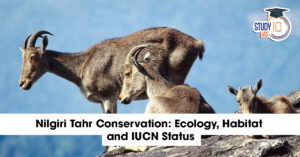Table of Contents
Amazon Fires
Context
- In the first four months of the year 2024, Brazil’s Amazon rainforest has experienced its largest blazes on record.
- This situation has raised concerns about the impacts of climate change, government policies, and human activities on the environment.
Background
- The Amazon rainforest plays a crucial role in mitigating global warming by absorbing vast amounts of greenhouse gases.
- However, a record drought exacerbated by the El Niño climate phenomenon and global warming has created exceptionally dry conditions, making the forest more susceptible to fires.
- Between January and April, over 12,000 square kilometres of the Amazon burned, the largest area recorded in more than two decades.
- This area is larger than Qatar or nearly the size of Connecticut in the United States.
Contributing Factors
- Climate Conditions:
- El Niño: This periodic climate pattern contributed to the drought conditions in the Amazon, reducing moisture levels and making the forest more vulnerable to fires.
- Global Warming: Rising global temperatures have intensified the severity of droughts and the likelihood of extreme weather events, contributing to the dry conditions that fuel fires.
- Human Activities:
- Land Clearing for Agriculture: Fires in the Amazon are generally not natural occurrences but are set by people to clear land for agricultural purposes.
- Reduced Firefighting Efforts: The environmental workers union Ascema partially attributed the fires to cuts in government spending on firefighting efforts.
- The budget for the environmental agency Ibama to fight fires was 24% lower than in 2023.
- Government Policies:
- Budget Cuts: The reduced budget for firefighting has hindered effective response efforts.
- Ibama agents have been on strike since January due to ongoing negotiations for better pay and working conditions.
- Emergency Measures: Despite budget constraints, the federal government allocated 405 million reais ($79.4 million) from the Amazon Fund for state-level firefighting efforts and deployed approximately 380 firefighters to the hardest-hit northern state of Roraima.
- Budget Cuts: The reduced budget for firefighting has hindered effective response efforts.
Implications
- Environmental Impact: The extensive fires have severe ecological consequences, including loss of biodiversity, disruption of water cycles, and increased carbon emissions, which further exacerbate global warming.
- Economic and Social Consequences: The fires threaten the livelihoods of indigenous communities and others dependent on the forest.
- Additionally, the destruction of vast forest areas can impact agriculture, water resources, and air quality, leading to broader socio-economic challenges.
- Global Climate Policy: Brazil’s President Luiz Inacio Lula da Silva has emphasised protecting the Amazon and restoring Brazil’s leadership in climate policy.
- However, the ongoing fires and budget cuts undermine these efforts and raise questions about the country’s commitment to environmental protection.
Recommendations
- Increased Funding and Resources: Reversing budget cuts and providing adequate funding for firefighting and prevention efforts are crucial.
- Ensuring stable working conditions and fair compensation for environmental workers is essential for effective fire management.
- Preventive Measures: Implementing comprehensive prevention strategies, such as raising awareness about fire risks, creating firebreaks, and conducting prescribed burns, can help mitigate the severity of future fires.
- International Collaboration: Leveraging international support and cooperation through initiatives like the Amazon Fund can enhance Brazil’s capacity to protect the rainforest and combat climate change.
- Sustainable Land Management: Promoting sustainable agricultural practices and enforcing regulations against illegal land clearing can reduce human-induced fire incidents.
Climate Shield
Context: Recent studies highlight significant economic and environmental impacts of global warming, emphasising the necessity of building resilience against climate change.
Economic Impact of Global Warming
- World GDP Impact: The World GDP would be 37% higher today if global warming had not occurred between 1960 and 2019, according to a new working paper by economists at the US’s National Bureau of Economic Research (NBER).
- Future Economic Losses: Another study published in Nature suggests that average incomes will fall by almost a fifth in the next 26 years compared to what they would have been without climate change.
- Costs of Transition: Both studies agree that the cost of transitioning from fossil fuels, though significant, pales in comparison to the costs imposed by global warming.
- Holistic Approach: The NBER research takes a more comprehensive approach by linking global impacts with local effects, arguing that the economic costs of a hotter planet could be six times more than previous estimates.
Environmental and Health Impacts
- Heat Waves and Natural Disasters: The impacts of heat waves, floods, storms, and other climate-related events impair people’s health, reduce productivity, and affect livelihoods.
- Rangelands and Ecosystems: Poorly understood ecosystems, such as drylands, are likely to be more affected by climate change.
- The UN Convention on Combating Desertification report highlighted that over 50% of these ecosystems, including desert shrublands, mountain pastures, tundra, and plateaus, have degraded.
Vulnerability and Conservation
- Vulnerable Ecosystems: Most of these ecosystems are recognized as vulnerable and their role as carbon sinks is acknowledged.
- However, rangelands do not receive as much attention as forests in conservation efforts.
- India’s Pastoralists: In India, the socio-ecological role of pastoralists on these ecosystems is gaining recognition.
- Pastoralist communities like the Maldharis, Van Gujjars, and Rabaris face significant challenges in the modern economy.
Global Climate Mitigation Strategies
- Resilience Against Climate Change: Protecting people from climate impacts involves improving resilience against climate-related catastrophes.
- The recent studies underline the importance of understanding ecosystem vulnerabilities and integrating these insights into climate mitigation strategies.
- Upcoming Climate Conference: The upcoming Conference of Parties (CoP) in Azerbaijan’s capital Baku will need to address these imperatives, shifting the paradigm towards more effective climate action.
Examples, Case Studies And Data
- Challenges Associated with Mangroves (GS 3): A study conducted using the International Union for Conservation of Nature’s (IUCN) Red List of Ecosystems highlighted that:
- Over half of the world’s mangrove ecosystems are at risk of collapse.
- Nearly one in five mangrove ecosystems face severe risk.
- Climate Change Impact: Climate change threatens 33% of mangrove ecosystems.
- Threat Factors:
- Deforestation
- Development
- Pollution
- Dam Construction
- Sea-Level Rise
- Increased Frequency of Severe Storms.
- Environmental and Economic Impact
- Carbon Storage Loss:
- Predicted loss of 1.8 billion tonnes of carbon stored in mangroves by 2050.
- This loss represents 16% of the total current carbon stored in mangroves.
- Valued at least USD 13 billion in voluntary carbon markets.
- Carbon Storage Loss:


 Graphic Processing Units (GPUs) – Work...
Graphic Processing Units (GPUs) – Work...
 Gold Imports and the Indian Economy – ...
Gold Imports and the Indian Economy – ...
 Nilgiri Tahr Conservation: Ecology, Habi...
Nilgiri Tahr Conservation: Ecology, Habi...




















